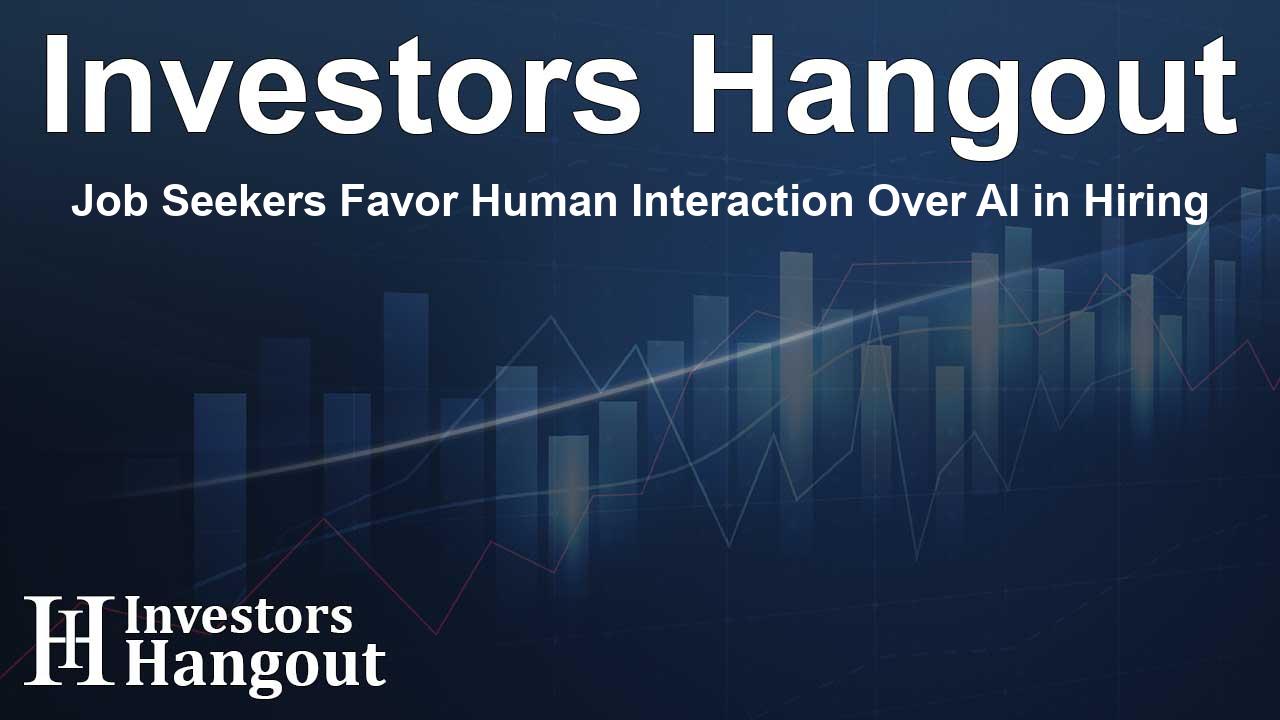Job Seekers Favor Human Interaction Over AI in Hiring

Understanding Job Seekers' Preferences in Recruitment
In the evolving landscape of recruitment, a captivating trend has emerged regarding the preferences of U.S. job seekers when it comes to the hiring process. A recent survey revealed that a notable 62% of job seekers are inclined to avoid applying to companies that heavily depend on generative AI for their hiring decisions. This statistic underscores a growing sentiment that prioritizes human interaction over technological efficiency.
The Importance of Human Touch
Job Seekers Voice Their Concerns
Job seekers today express strong preferences for human involvement in various stages of the hiring process. While many acknowledge the usefulness of AI in drafting resumes and creating interview questions, they stress the critical role that human reviewers play in evaluating candidates. In fact, 87% of participants in the survey voiced that having a human interviewers is essential, as they believe that AI lacks the ability to gauge soft skills crucial for workplace culture and individual attitudes.
Human Review of Resumes and Interviews
Notably, an impressive 84% of job seekers prefer receiving feedback on their resumes and cover letters from a human rather than relying on AI systems. The desire for personal interaction indicates a longing for understanding and empathy that many feel AI cannot replicate. Despite the advancements in generative AI, more than 73% of job seekers expressed doubts about the balance of benefits versus risks associated with AI in hiring procedures.
Balancing AI Efficiency with Human Judgement
The Role of AI in Recruitment
Interestingly, while concerns surrounding the use of AI persist among job applicants, hiring managers resonate with a more favorable view of AI technology. About 66% of hiring managers report that their organizations employ generative AI, noting benefits such as enhanced customer service capabilities and improved operational efficiency. Many believe that AI can streamline processes, allowing employees to focus on more substantive work rather than repetitive tasks.
Adoption of AI in the Workforce
A deeper dive into the data reveals that nearly half of the companies surveyed are already implementing automation and AI technologies to fill job openings. Furthermore, as competitive labor markets persist, 54% of organizations plan to adopt AI aggressively in the coming years to overcome hiring challenges, with indications that about 43% are considering replacing a significant portion of their workforce with AI solutions.
Finding the Right Balance
As the workforce adapts to these technological advancements, companies face the intricate task of marrying efficiency with the need for human connection. While a substantial 83% of hiring managers acknowledge AI’s effectiveness, a compelling 68% caution against its unchecked use, advocating for maintaining human involvement throughout the recruitment journey. Nearly 90% assert that human engagement is crucial for assessing the true attributes of candidates, emphasizing that a blend of both AI and human judgment is essential.
Expert Insights
Bill Stoller, the CEO of Express Employment International, captured the essence of this discussion perfectly when he remarked, "AI is undeniably a powerful tool, but its role should be to complement human judgment, not replace it." He highlights the significance of transparent communication about how AI is used in hiring and stresses the necessity of ensuring human empathy is woven into the recruitment fabric.
Conclusion: The Future of Hiring
As the debates surrounding AI in hiring continue, one thing is clear: job seekers value the human element of the recruitment process. Their voices demand that companies utilize technology to enhance, rather than diminish, the recruitment experience. In an era where automated solutions are becoming increasingly prevalent, organizations should prioritize the delicate balance between technological advancement and preserving the human aspects that foster trust and connection throughout the hiring process.
Frequently Asked Questions
What percentage of job seekers prefer human skills in hiring?
According to recent surveys, 62% of U.S. job seekers are inclined not to apply to companies relying heavily on generative AI during hiring processes.
Why do job seekers prefer human interaction?
Job seekers believe that humans are better equipped to assess soft skills crucial to workplace culture, which AI may overlook.
How do hiring managers view AI in recruitment?
A majority of hiring managers recognize the efficiencies AI can offer but also stress the need for human judgment throughout the hiring process.
What are the major benefits of using AI in hiring?
AI assists in enhancing customer service, improving process efficiency, and closing skills gaps, among other advantages.
Is there a gender difference in attitudes towards AI in hiring?
Yes, studies show female job seekers are generally less likely than male counterparts to find the use of generative AI appropriate for various job-related tasks.
About The Author
Contact Lucas Young privately here. Or send an email with ATTN: Lucas Young as the subject to contact@investorshangout.com.
About Investors Hangout
Investors Hangout is a leading online stock forum for financial discussion and learning, offering a wide range of free tools and resources. It draws in traders of all levels, who exchange market knowledge, investigate trading tactics, and keep an eye on industry developments in real time. Featuring financial articles, stock message boards, quotes, charts, company profiles, and live news updates. Through cooperative learning and a wealth of informational resources, it helps users from novices creating their first portfolios to experts honing their techniques. Join Investors Hangout today: https://investorshangout.com/
The content of this article is based on factual, publicly available information and does not represent legal, financial, or investment advice. Investors Hangout does not offer financial advice, and the author is not a licensed financial advisor. Consult a qualified advisor before making any financial or investment decisions based on this article. This article should not be considered advice to purchase, sell, or hold any securities or other investments. If any of the material provided here is inaccurate, please contact us for corrections.
